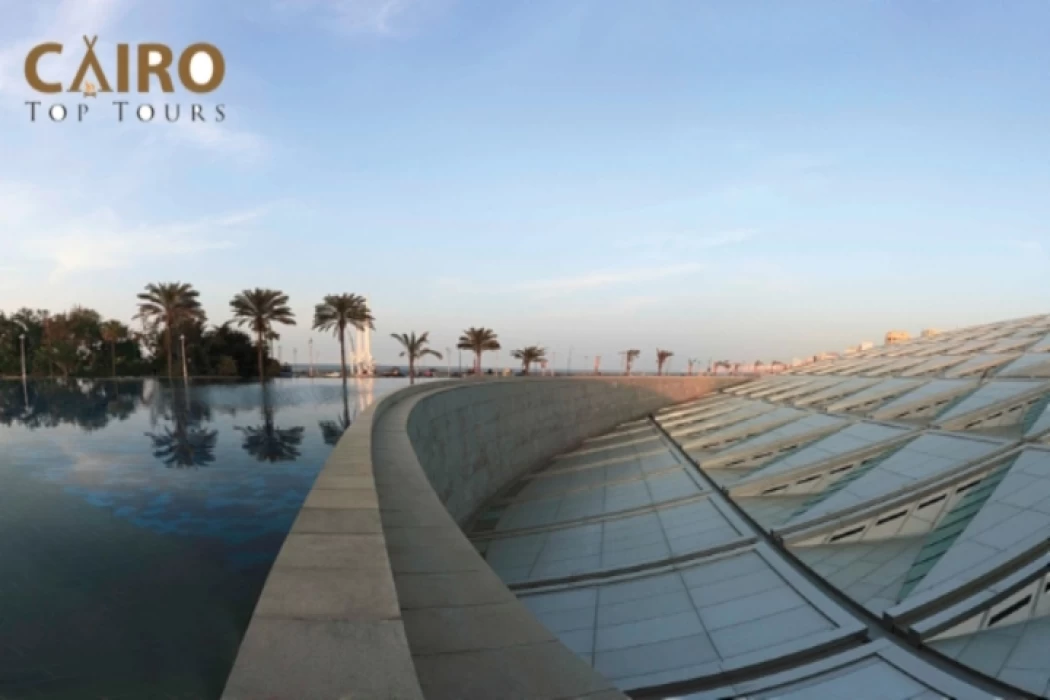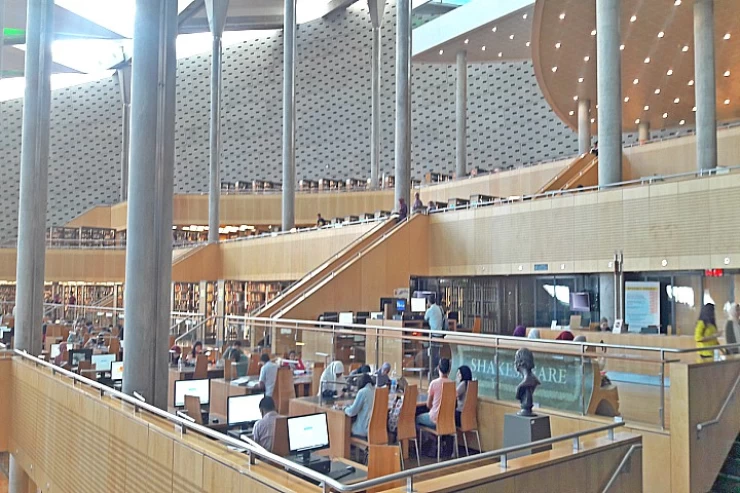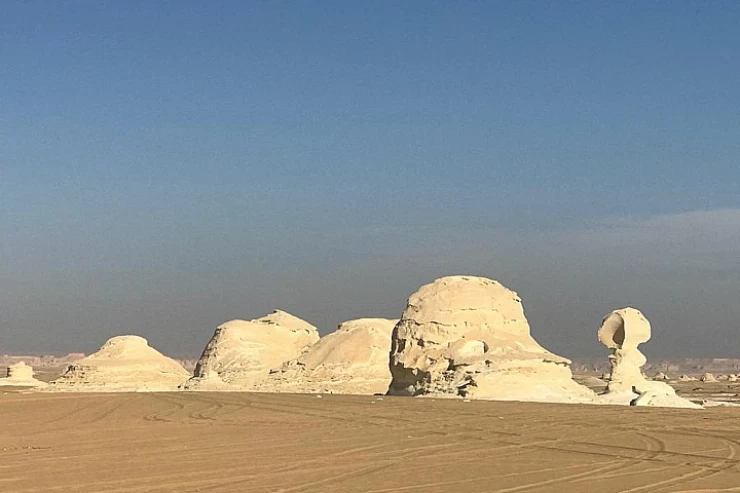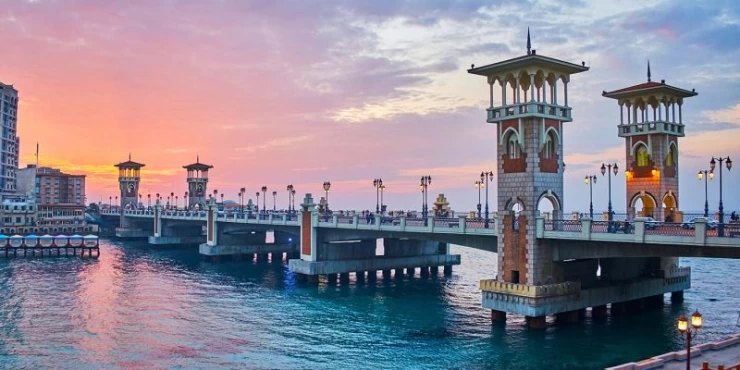
Alexandria biblotheca
The Bibliotheca Alexandrina is a large library and cultural institution located on the Mediterranean Sea in Alexandria, Egypt. It commemorates the Library of Alexandria, which was once one of the world's largest libraries but was lost in antiquity. The Bibliotheca Alexandrina houses literature in classical Arabic, English, and French languages.
The notion of resurrecting the old library dates back to 1974 when Alexandria University formed a committee to pick a block of land for its new library. Construction began in 1995, and after spending around US$220 million, the facility was officially inaugurated on October 16, 2002. In 2009, the Bibliothèque Nationale de France (BnF) donated 500,000 books to the library. With the gift, the Bibliotheca Alexandrina is now the world's sixth-largest Francophone library.
The library has shelf space for eight million books, and its main reading room is 20,000 square meters (220,000 square feet). The complex also includes a conference center, specialist libraries for maps, multimedia, the blind and visually impaired, and children, four museums, four art galleries for temporary exhibitions, fifteen permanent exhibitions, a planetarium, and a manuscript restoration laboratory.
History
The notion of restoring the Library of Alexandria dates back to 1974, when a committee formed by Alexandria University chose a block of land for its new library between the university and the beachfront, near where the ancient library had stood. Former Egyptian President Hosni Mubarak was a key sponsor of the project, which also included a collaboration with UNESCO.
UNESCO held an architectural design competition in 1988 to select the design. Snøhetta, a Norwegian architectural practice, won the competition over 524 other entries. UNESCO also established the International Commission for the Bibliotheca Alexandrina. Non-primary source required]. The first offers for funding the project were made at a 1990 conference at Aswan along the upper Nile River, with US$65 million coming primarily from MENA governments. Construction began in 1995, and after an additional US$220 million was spent, the complex was officially inaugurated on October 16, 2002.
The Internet Archive contributed $5 million to the BA, which included 10 billion online pages from over 16 million sites, 2000 hours of Egyptian and US television broadcasts, 1000 historical films, 100 terabytes of data kept on 200 computers, and a book scanning facility for local books.[8] The library also received a 500,000 book donation from the Bibliothèque Nationale de France in Paris.
Features
The library has a shelf capacity for eight million books, and the main reading area spans 20,000 square meters (220,000 square feet) across eleven cascading levels. The complex also includes a conference center, specialized libraries for maps, multimedia, the blind and visually impaired, young people, and children, four museums, and four art galleries for temporary exhibitions, The main reading area is located beneath a 32-meter-high glass-paneled canopy that tilts out toward the sea like a sundial and measures around 160 meters in a circle. The walls are grey granite, engraved with characters from 120 scripts.
Services
The main library can accommodate up to eight million books. The Espresso Book Machine at the library allows patrons to print books on demand. The Taha Hussein Library has items for the blind and visually challenged, including unique software that allows readers to read books and journals. It is named after Taha Hussein, an Egyptian Arabic professor and literary critic who was blinded at the age of three. Contains book compilations of Nobel Prize Laureates in Literature dating back to 1901. Queen Silvia of Sweden and Queen Sonja of Norway launched the Nobel Section on April 24, 2002.
Permanent exhibitions
The Our Digital World exhibition showcases several of the library's digital projects, such as prior presidents' digital archives, the Science Supercourse, and the Encyclopedia of Life. There are also digital copies of works available, like Description de l'Égypte and L'Art Arabe.
The World of Shadi Abdel Salam exhibition showcases the works of Egyptian cinema director and screenwriter Shadi Abdel Salam. His family donated the work. The Impressions of Alexandria exhibition is divided into two parts: Alexandria as perceived by Artists and Travelers, and Cosmopolitan Alexandria: a Photographic Memory.
The Digital Assets Repository (DAR) is a system developed at the Bibliotheca Alexandrina by the International School of Information Science (ISIS) that maintains a digital library collection while also providing free public access to the library's digitized collections through web-based search and browsing facilities via the DAR website.
During the 2011 Egyptian revolution, young adults formed a circle around the library to defend it from looters and vandals. Students from neighboring colleges account for 80% of Bibliotheca Alexandrina patronage. In 2011, the Bibliotheca Alexandrina hosted several symposiums, many of which focused on the 2011 Egyptian revolution. Other themes covered in these symposiums included social work. All of these events were freely available to the public.
Library fire
In 48 BC, Julius Caesar burned nearly a hundred ships on the shore of the Mediterranean Sea in front of the Library of Alexandria after Cleopatra's brother Ptolemy the Younger besieged him after he felt that Julius Caesar was supporting Cleopatra against him, and the fires of burning ships spread to the library.
The Library of Alexandria in the modern era
The Library of Alexandria was revived in the modern era after being left in ruins for centuries and considered a lost relic. The new Bibliotheca Alexandrina was built on the same site as the old library.
The height of the library is ten stories, and all lower levels are located below the surface of the water, and the body of the building sinks below the ground to protect its precious contents from the external environment, and the many open reading halls are the prominent feature of the Alexandria Library, which includes 2500 reading sections leading to seven balconies, and the books have been stored under these balconies for easy access.
The Library of Alexandria was the world's largest library it was established by King Ptolemy I and it housed about 900,000 manuscripts throughout his reign.
The original library had all the article's secrets regarding the traditional civilization of Egypt.
Library of Alexandria
Its destruction has been attributed to totally different actors, however, no version has been tried, the sole clear issue is that it finally disappeared, and it was not till 1987 that a world project wanted to rescue the cultural significance of the location and therefore the image it represents, began the legendary collective imagined library of humanity. UNESCO coordinated the project and eventually, the name the Alexandria Library, it was formally opened in 1996.
As well to its massive archive, which can withstand carrying about twenty million copies, and a space for over 2,000 simultaneous scholars, it also has a planetarium, and a Science Museum, one for calligraphy and the other one for archaeology, in addition to a laboratory of restoration, a modern printing press and a library specialized for children and people with special abilities.
Discover the Bibliotheca of Alexandria and many other monuments in the city that was built by the legendary Macedonian ruler Alexander the Great in 332 B.C. by booking the traditional day tour to Alexandria from Cairo to enjoy the best atmosphere in the whole country of Egypt.
Sitting on the shores of the Mediterranean Sea in Alexandria, the Bibliotheca Alexandrina is a stunning monument to one of the most famous primal libraries. The New Library of Alexandria is designed in modern architectural design, houses an incomprehensible variety of materials, and utilizes the latest available technological advancements; thus, the New Library of Alexandria has become a beacon of information and heritage for researchers and tourists alike. In this article, we investigate the exceptional history and remarkable achievements of Bibliotheca Alexandrina, including its establishment, architectural design, collections, and contribution to education and intercultural communication today.
The Library of Alexandria, which first came into existence around the 3rd century before the Common Era, was an ancient library in the world that was massive and of great geographical significance. It captured the brainpower of Alexandria in that scholars and learned men and women from every part of the globe trooped in to learn, converse, and even teach. Even though the old library was unfortunately burned down to ashes, its memory has been able to motivate the entire world positively.
In the late 20th century, Egypt was involved in far-reaching activities to undertake this effort, with the help of UNESCO and several countries around the world. The purpose was to create a modern library that would also incorporate an area for educational and communal interactions rather than a boring storage place for books. This she envisaged for completion in the year 2002 with the formal launch of the Bibliotheca Alexandrina, a newly built facility located in proximity to the ancient library of Alexandria.
The edifice, whose creation was by the Norwegian architecture firm Snøhetta, has quite interesting traditional and modern architecture. The building structure of Bibliotheca Alexandrina, takes the form of a huge blunt disk at an angle, symbolizing the sun of knowledge, which brings light to Alexandria and other places. The design is well thought out to retain the historical, cultural, traditional, and ethnic values of Egypt in building a modern center.
One of the most notable elements of the library is the granite wall that surrounds the building and has engravings in 120 languages illustrating the people's linguistic richness. This very well represents the ideals of the library, which is to become a place for everyone everywhere, a true learning and inclusive center. Another characteristic feature of the construction is its sloping roof, which enables the penetration of sunlight in the interior, providing a calm and pleasant ambiance conducive to reading, working, or admiring the structure.


















